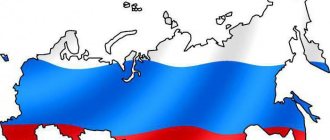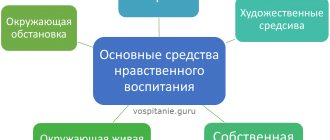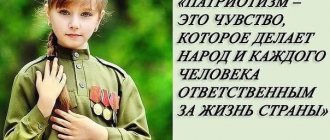Pedagogical project “Patriotic education using innovative technologies”
#Local history #Publications #Project and research work #Primary school teacher #Additional education teacher #Educator #Intern student #Preschool education #Counselor
Municipal budgetary preschool educational institution “Kindergarten No. 18 “Rucheyok” Tambov-2015 Educator: Pinchuk L.V. PATRIOTIC EDUCATION OF PRESCHOOL CHILDREN USING INNOVATIVE TECHNOLOGIES PEDAGOGICAL PROJECT
Is 70 years a lot or a little? If you look back at an individual person - a whole life... If you look around the country - a small page of history... 70 years separate us from that memorable day in the history of our Motherland when the GREAT PEOPLE won a GREAT VICTORY. The idea of the project: on the basis of search and research activities, to develop children’s desire to learn as much as possible about the history of the country and hometown during the Great Patriotic War, about its heroes. PROJECT IDEA
Patriotism - love for the Motherland, devotion to it, responsibility and pride for it, the desire to work for its benefit, to protect and increase its wealth - begins to form already in preschool age. It is impossible to cultivate self-esteem, self-confidence, and, consequently, a full-fledged personality, without respect for the history and culture of one’s Fatherland, for its state symbols. (“Concept of Patriotic Education of Citizens of the Russian Federation”) One of the main objectives of the Federal State Educational Standard for Education is: “Combining training and education into a holistic educational process based on spiritual, moral and sociocultural values and socially accepted rules and norms of behavior in the interests of the individual, family, and society.” . Therefore, moral and patriotic education is one of the most important links in the system of educational work in preschool educational institutions. PATRIOTISM AND PATRIOTIC EDUCATION
You cannot be a patriot without knowing how our ancestors loved and took care of their Motherland. Do our children know why their great-grandparents received medals? It is important to bring the child to understand that we won because we love our Fatherland. The Motherland honors its heroes who gave their lives for the happiness of people. Their names are immortalized in the names of cities, streets, squares, and monuments have been erected in their honor. RELEVANCE June 22, 1941 May 9, 1945 May 9, 2015
Problems: - lack of knowledge about their hometown, its history, sights, children doubt the answers, and their parents do not know how to correctly talk about the Great Patriotic War and its heroes; — insufficient material and technical base. Ways to overcome them: - interest parents in joint project activities; — create original developments (presentations, games, booklets, wall newspapers, etc.); - involve the public in the project.
CONTRADICTION The choice of the topic of work is determined by the existing contradictions in society. On the one hand, the loss of traditional Russian patriotism has become increasingly noticeable, and on the other hand, the desire to revive the work of developing patriotic feelings in children, which are expressed in appropriate actions and behavior. Raising patriotism is possible when children have at least basic knowledge about the history of their country and hometown, when they become direct participants in the preparation and celebration of such holidays as Victory Day.
One of the most effective methods of patriotic education is project activity, which allows you to create a natural situation of communication and practical interaction between children and adults. Project activity helps the child to show creativity, teaches him to see the future of his mental activity, and plan his actions to achieve a certain goal. At the same time, work on the project helps to strengthen educational influences, since the education of the individual occurs in a complex, in the interaction of objects of the social environment, and ensures the unification and integration of different types of activities. I LIVE ON THE STREET OF HEROES Pedagogical project
PROJECT PASSPORT Type of project: group, long-term Content: educational, research, creative Project participants: - educators - pre-school specialists - pupils - parents Implementation period: December 2014 - May 2015
Pupils: specially organized activities, joint activities of adults and children, independent children's activities Teachers: active methodological work, integration of activities to develop patriotism Parents: participation in project and research activities, assistance to teachers, participation in preschool educational institutions TARGET GROUPS
Conditions for successful implementation of the project Creation of conditions for children's activities within the framework of the project Establishment of a center for moral and patriotic education in groups Implementation of close cooperation with all employees of the preschool educational institution Readiness of preschool educational institutions teachers to implement project activities Personally-oriented interaction between an adult and a child Active participation of parents in project activities
Creating effective conditions for the formation of patriotic feelings, love for the Motherland, and pride in preschoolers based on expanding children’s ideas about the Great Patriotic War and the feat of our people. PROJECT GOAL If not us, then who will help our children love Russia and know how important it is not to be late!
1. Study problems in theory and practice. 2. To identify the level of patriotic education of preschoolers and their parents. 3. Expand and deepen children’s knowledge about the city of Tambov, its history, heroes, sights, and the heroic past of our citizens. 4. To form in children a feeling of love for the Motherland, introducing them to their native culture and traditions through creative, design, educational and research activities. 5. To develop in children the creative abilities and personality qualities they need to carry out further educational activities. 6. Involve parents in the educational process to work together to study the city, orient them towards patriotic education in the family. 7. Determine the level of effectiveness of the work done. 8. Generalization and dissemination of experience on the project topic. PROJECT OBJECTIVES
Using the project method allows: - the child to feel like a researcher; — create a unified educational space and ensure the quality of education in preschool educational institutions; — integrate information from different fields of knowledge; - involve various types of children's activities. NOVELTY OF THE PROJECT Inclusion of museum pedagogy in the educational process. Using ICT technology to create original multimedia presentations, virtual excursions, quizzes, crosswords, consultations for teachers and parents.
PREDICTED RESULT: - increasing the moral level of students; - broadening the horizons of children, their interest in the history of their hometown; — development of initiative, intelligence, independence; — transformation of the group’s subject-game environment; — organization of pedagogical search through the implementation of innovative forms; — strengthening the interest of parents in cooperation with the kindergarten on issues of moral and patriotic education; - showing children a sense of pride in their hometown, respect for its history, the people who live and work here; acquaintance with the hometown will continue in the daily life of the group, on a walk, in the family. —
PROJECT STAGES December 2014 - January 2015 Preparatory stage Self-improvement on this topic. Organization and carrying out preparatory work for the implementation of project activities. February - May 2015 Project implementation Organization and implementation of project events. May 2015 Final stage Summing up, analyzing the results of the project implementation. Determining future prospects. Dissemination of positive experience among teachers of preschool educational institutions and the city.
thematic planning of material, personality-oriented communication, cultural conformity, freedom and independence, integration of various types of children's activities, humane and creative orientation, clarity and entertainment, sequence (from simple to complex) Principles
Monitoring of children and questioning of parents Development of a plan for project implementation. Assessing one’s own capabilities and resources for implementing the project Studying literature, new methods and technologies on the issues of moral and patriotic education of children Consulting with teachers, developing practical material Individual consulting with parents and involving them in collecting visual material and necessary literature Establishing contacts with public organizations PREPARATORY STAGE
An exhibition of literature was organized in the mini-museum of the preschool educational institution “Living Memory of the Past.” Presentations for thematic classes and discussions, virtual excursions were created, a route to memorable places, and lesson notes were developed. Centers for patriotic education have been organized in the groups, literature and attributes for games have been selected. An exhibition of literature was organized in the mini-museum of the preschool educational institution “Living Memory of the Past.” Presentations for thematic classes and discussions, virtual excursions were created, a route to memorable places, and lesson notes were developed. Centers for patriotic education have been organized in the groups, literature and attributes for games have been selected.
MAIN STAGE Conducting a musical and poetic composition “From Tambov to Berlin”, a poetry competition, a review of formations and songs. Visiting a children's library or museum. Visit to a thematic exhibition at the local history museum. Organizing excursions to monuments and memorial plaques on Engels Street, laying flowers. Carrying out joint events with parents, veterans, home front workers, organizing meetings, conversations, educational activities, virtual excursions: “Eternal Flame”, “Warrior-Liberator”, “Children about the war”, “Streets in Tambov and Volgograd are named after him! "," Heroes of the Great Victory lived on Engels Street in Tambov." Organization of an exhibition of works. Design of a memory book. Release of booklets and leaflets “Trace of War in My Home.” Organization of project and play activities for children.
MAIN STAGE
IN THE MUSEUM “LIVING GLORY OF THE PAST” AND IN GROUPS
SEARCH AND RESEARCH ACTIVITIES
Preparation and organization of excursions to memorial plaques along Engels Street and to the monument to the Feat of Medics in the Great Patriotic War.
GAME ACTIVITIES
Children expressed their impressions in creative works
PARENTAL INVOLVEMENT
THE FINAL STAGE
The teacher had the opportunity for self-realization and creativity in his work in accordance with his professional level. Parents had the opportunity to actively participate in an important process - moral and patriotic education, and were involved in research activities. Children were involved in search and research activities, organized in accordance with their interests, desires, and needs PROJECT RESULTS
PROJECT RESULTS Presentation of the album “Your feat in our hearts” with the results of the research activities of children and their parents. Presentation of children's mini-projects. Analysis of the results obtained. Speech at the teachers' meeting. Publishing a newspaper for parents. Analysis, synthesis and dissemination of project results: presentation at the teachers' meeting.
SIGNIFICANCE OF THE PROJECT Formation of not only patriotic feelings, but also intellectual, aesthetic, social and personal qualities, responsibility, and initiative of students in general. Application of the project method of developmental education, an integrated approach in educational relations, participation of parents in the development of family projects. Showing parents' activity in joint events, enriching their experience in introducing preschoolers to family values and traditions.
IDENTIFYING THE LEVEL OF CHILDREN'S KNOWLEDGE ABOUT THE HEROIC PAST AND PRESENT OF THEIR HOMETOWN
GENERALIZATION OF EXPERIENCE
LIST OF REFERENCES USED: Igushentseva A. Museum of Military Glory // Preschool Education 2006 No. 5, pp. 11-13. Komarova T. Art as a factor in nurturing love for the native land // Preschool education 2006 No. 2, pp. 3-8. Komratova N. On the civic education of preschoolers // Preschool education 2006 No. 5, pp. 3-10. Kazakova N.V. A big river begins with a fontanel, love for the homeland from kindergarten // Preschool teacher 2008 No. 12, pp. 31-36. Soboleva I. To love your small homeland. // Preschool education 2005 No. 10, pp. 52-54. Tatarinkova L.Yu. The rights of a small citizen. Series “To Kids about the Motherland” St. Petersburg: Litera Publishing House, 2007. Tatarinkova L.Yu. I and my family. Series “To Kids about the Motherland” St. Petersburg: Litera Publishing House, 2007. Federal state educational standard for preschool education Order of November 14, 2013 Registration No. 30384.
INFORMATION RESOURCES https://nsportal.ru/detskiy-sad/raznoe/2015/11/10/vizitnaya-kartochka-portfolio-ya-zhivu-na-ulitse-geroya https://dsrucheek.68edu.ru/index.php ?option=com_content&view=category&layout=blog&id=26&Itemid=12 https://www.maam.ru/detskijsad/zhivaja-pamjat-o-bylom.html https://www.i-shag.ru/ https://nsportal .ru/ www.maam.ru https://www.obruch.ru/ https://www.dovosp.ru/ https://doshkolnik.ru/scenary.php https://detsadclub.ru/ https:/ /www.taminfo.ru/tambov_novosti/culture



